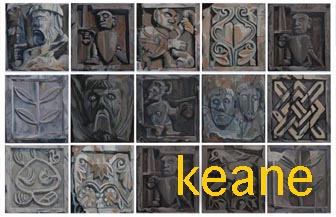A brief ceremony in Barga Vecchia this afternoon as three pomegranate trees were planted in Piazza S.Felice adding to the abundant greenery of the Piazza.
The ceremony, conducted by Manuela Bollati in front of a small audience included seeds, candles, milk and a prayer to the Greek Goddess Demeter as the three trees were planted in the corner of the piazza.
“Hail Demeter, many times hail,
generous in food, rich in abundance.
And just as there are four horses
with white manes that pull the basket,
so does the Great Goddess; very powerful,
she will bring white spring
and white summer and also winter and autumn,
and she will protect us from year to year.
And just as we walk barefoot and without bandages on our heads
in the city, so forever
we will have unscathed feet and head.
And just as the bearers carry baskets full of gold,
so we will have gold in abundance. The uninitiated
shall not go beyond the Prytaneum of the city,
the priestesses shall follow the Goddess,
if they have not reached sixty years of age,
until the end. But for those who are burdened,
for those whose hands reach out to Ilithyia,
for those in labor, for them it will be enough
until their knees bear weight.
Deo will provide them with all things
in abundance and the ability to come
to her temple.
Hail, Goddess, preserve
this city in harmony and opulence.
Bring forth all the products of the land,
give nourishment to the cattle, bear fruits,
bring the sheaf, grant the harvest,
and also nurture peace, for he who plows,
he also reaps.
Show favor to me, invoked
thrice in supplication,
greatly powerful among the Goddesses.”
In ancient Greek religion and mythology, Demeter is the Olympian goddess of the harvest and agriculture, presiding over crops, grains, food, and the fertility of the earth. Although she is mostly known as a grain goddess, she also appeared as a goddess of health, birth, and marriage, and had connections to the Underworld.
The pomegranate is native to a region from modern-day Iran to northern India. Pomegranates have been cultivated throughout the Middle East, India, and Mediterranean region for several millennia. Pomegranates may have been domesticated as early as the fifth millennium BC, as they were one of the first fruit trees to be domesticated in the eastern Mediterranean region
The name pomegranate derives from medieval Latin pōmum “apple” and grānātum “seeded”. Possibly stemming from the old French word for the fruit, pomme-grenade, the pomegranate was known in early English as “apple of Grenada”—a term which today survives only in heraldic blazons. This is a folk etymology, confusing the Latin granatus with the name of the Spanish city of Granada, which is derived from an unrelated Arabic word.
 |
 |
 |
 |
“Una breve cerimonia a Barga Vecchia questo pomeriggio, durante la quale sono stati piantati tre alberi di melograno in Piazza S. Felice, aggiungendosi alla ricca vegetazione della piazza.
La cerimonia, condotta da Manuela Bollati davanti a una piccola platea, ha incluso semi, candele, latte e una preghiera alla Dea Greca Demetra mentre i tre alberi venivano piantati nell’angolo della piazza.
Salve Demetra, molte volte salve,
generosa di cibo, ricca a staia.
E come sono quattro le cavalle
di chioma bianca che il canestro tirano,
così la Grande Dea; molto potente,
verrà portando bianca primavera
e bianca estate e inoltre inverno e autunno
e ci proteggerà da un anno all’altro.
E come scalzi e senza bende in capo
camminiamo in città, così per sempre
avremo in tutto illesi piedi e capo.
E come pieni d’oro i cesti portano
le portatrici, così avremo l’oro
in abbondanza. Le non iniziate
non oltre il Pritanèo della città,
le addette al rito seguano la Dea,
se non hanno compiuto i sessanta anni,
fino alla fine. Ma per chi è pesante,
per chi le mani verso Ilitia tende,
per chi ha le doglie, per costoro basta
finché non hanno peso le ginocchia.
Darà loro Deo tutte le cose
in abbondanza e di poter venire
fino al suo tempio.
Salve, Dea, conserva
questa città in concordia e in opulenza.
Porta tutti i prodotti della terra,
ai buoi da’ nutrimento, porta i frutti,
porta la spiga, da’ la mietitura,
anche la pace nutri, perché mieta,
colui che arò.
Propizia a me dimostrati
tre volte nelle suppliche invocata,
grandemente potente tra le Dèe.
Nell’antica religione e mitologia greca, Demetra è la Dea Olimpica del raccolto e dell’agricoltura, presiedendo alle colture, ai cereali, al cibo e alla fertilità della terra. Sebbene sia principalmente conosciuta come dea dei cereali, appariva anche come dea della salute, della nascita e del matrimonio, ed aveva legami con l’Oltretomba.
Il melograno è nativo di una regione che va dall’attuale Iran all’India settentrionale. I melograni sono stati coltivati per diversi millenni in tutto il Medio Oriente, l’India e la regione mediterranea. Potrebbero essere stati addomesticati già nel quinto millennio a.C., poiché sono stati uno dei primi alberi da frutto ad essere addomesticati nella regione del Mediterraneo orientale.
Il nome melograno deriva dal latino medievale “pōmum” (mela) e “grānātum” (seminato). Possibilmente derivando dalla vecchia parola francese per il frutto, “pomme-grenade”, il melograno era conosciuto nell’antico inglese come “apple of Grenada” – un termine che oggi sopravvive solo negli stemmi araldici. Questa è una etimologia popolare, che confonde il latino “granatus” con il nome della città spagnola di Granada, che deriva da una parola araba non correlata.”









